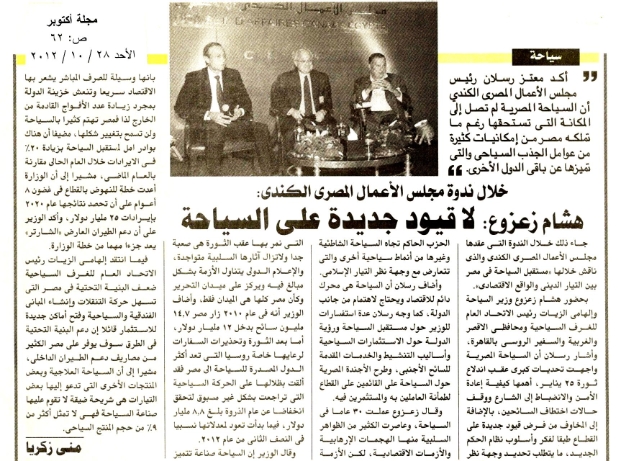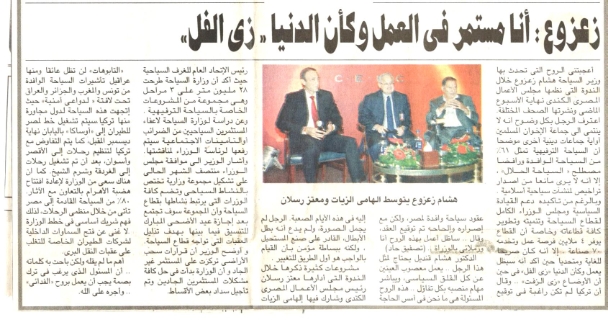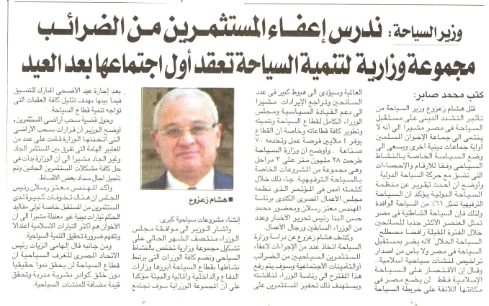
Date
Speaker(s)
Designation
Description
The Canada Egypt Business Council (CEBC) hosted a special event and panel discussion featuring H.E. Hisham Zaazou, Egyptian Minister of Tourism and Mr. Elhamy El Zayat, Chairman of the Egypt Tourism Federation. The discussion revolved around concerns regarding the tourism sector, which is a pivot of Egyptian economy, in light of the rise of Islamists to power. Governmental ministers, distinguished ambassadors, prominent CEBC members and guests attended the event.
CEBC Chairman, Mr. Motaz Raslan, delivered the opening remarks for the discussion. Raslan paved the way for the discussion by commending on Egypt’s unrivaled heritage and nature, which placed it on top of every traveler’s list. However, he sees that lately tourism in Egypt is not at the level. He spoke of the challenges the sector faced in the past, starting with acts of terrorism in the nineteen nineties and ending with the repercussions of 25 January revolution. He described these repercussions as not only related to the security vacuum that followed the revolution, but also to the rise of Islamists to power in Egypt. Raslan criticized alarming statements made by some Salafi scholars or politicians calling for Halal beaches and other notions, which he said will cause confusion in the tourism market. Raslan added that there has not been the necessary reassurance from the ruling party to counter such calls. He concluded asserting the importance of tourism, especially at a time when its revenues are crucial for the long path of development the nation is embarking on.
Raslan then left the floor to Minister Zaazou to address the audience. Minister Zaazou has a long and celebrated career in the Ministry of Tourism. He assumed the position of the First Assistant to the former Tourism Minister in 2007 until he was assigned the tourism portfolio in August of this year. “Tourism is in a very bizarre situation,” the minister commenced his word. He sees that the challenges the tourism sector is facing today are not at all similar to challenges previously faced. The Minister stated that roughly 15 million tourists visited Egypt in 2010, generating revenues amounting to around 12.5 billion USD, which went down dramatically in 2011, which saw only 32% of the tourism in 2010. Zaazou also pinpointed the fact that as many countries changed their travel advisories to Egypt and warned their citizens of traveling to Egypt, the situation naturally spiraled downward, however the minister finds that the situation started to improve as of the second half of 2012 and that the ministry’s goal is to double the number of tourists who visited Egypt in 2010 by 2020.
The Minister emphasized the importance of tourism to the Egyptian economy, saying that it is the most direct form of investment that has the ability to immediately invigorate the economy. He also sees that the legitimacy of the segmental protests that take place on a regular basis in Egypt are hindering the economy and not giving it the necessary space to “catch its breath” and get back on track.
The Minister said that transportation limitations cap the expansion of tourism in Egypt, “the ministry’s strategic targets are realistic and in line with the capacity of the infrastructure in Egypt”. The Minister then elaborated on the ministry’s eff0rts to revamp transportation from various countries around the world to several touristic destinations in Egypt; Cairo, Sharm El Sheikh, Taba, Luxor and Aswan. The Minister also highlighted efforts to attract tourists and affirmed that the ministry is collaborating with the Ministry for Antiquities Affairs to rehabilitate the Pyramids area and will hold an event to inaugurate much more tourist friendly Pyramids area within 45 days.“Our aim at the moment is to send out positive messages to the world about Egypt,” the Minister said. He added that the world defines conditions in Egypt through the unrelated incidents of violence that take place.
With regards to concerns about restrictions on tourism from the Islamist political leadership, the minister said that since the current cabinet came into place, there has been serious support to the tourism portfolio. He added that he believes that the current political leadership has shown profound interest in tourism and this is because they realize that the livelihood of many Egyptians depends on this sector. The Minister added that 4 million Egyptians work in tourism, adding that the coming period of time will witness an increase in leisure tourism and that the ministry’s long-term plan is to cater to that. He added that suggestions to develop other touristic products that cater to the Islamic and Arab worlds are welcome, but not at the expense of existing mainstream tourism.
Raslan then asked Mr. Elhamy El Zayat, tourism expert, Chairman of the Egypt Tourism Federation and President of Emeco for Tourism and Hotels, whether one should further invest in tourism or wait until the political future of the country is clearer. In answer to that, El Zayat said that at the moment the infrastructure cannot accommodate more tourists, thus the need is not to build more rooms, but to work on the infrastructure and on facilities serving the existing rooms. He said that he too believes there is openness among most political factions when it comes to tourism. He said that his Federation approached different political powers and all of the previous presidential candidates and advocated the pivotal role tourism plays in Egypt’s economy. In answer to the same question, Minister Zaazou affirmed that investors should go ahead and invest in tourism, adding that the ambience of concern and hesitation is not a characteristic of tourism, but of all sectors in Egypt at the moment, “We need to turn the page and start building,” the Minister said.
Attendees asked questions on the future plans of the ministry, their concerns with the Islamist current. Some of the attendees shared their views on how to improve tourism further.
The discussion was a robust one that disseminated optimism among attendees who are key stakeholders in the tourism industry. While their concerns are legitimate, being cautiously optimistic about the future is the better place to be for Egyptian investors who have Egypt’s welfare at heart. On the other hand, pragmatism shown by the ruling party and the presidency and their openness to business are reasonable grounds for taking prudent steps forward.






















